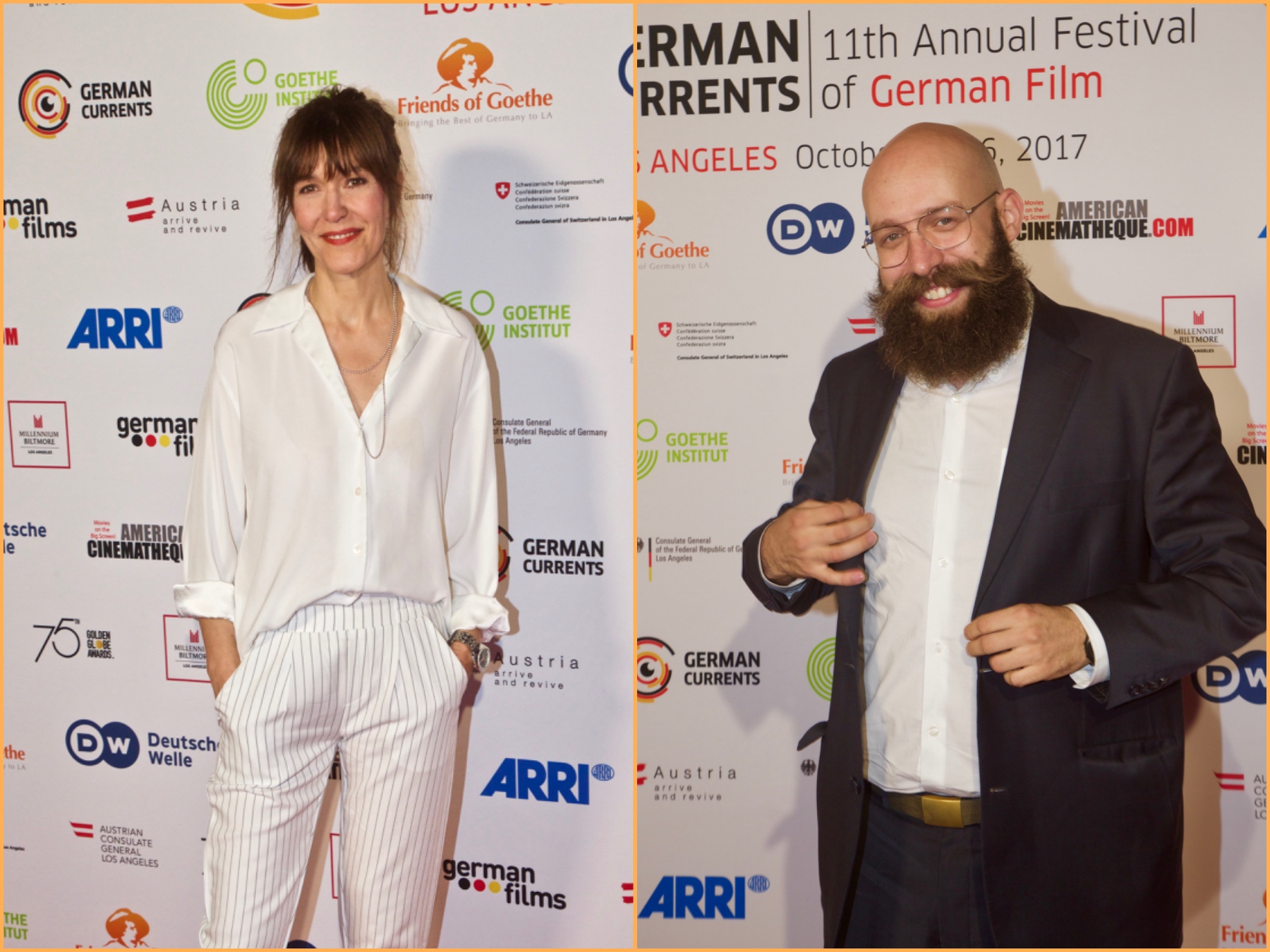
- Interviews
Talking ‘Tigers’ and Cinema at the German Currents Film Festival
For over a decade, the German Currents Film Festival has brought the best of German, Austrian and Swiss cinema to Los Angeles. This year’s festival line-up included a special focus on films from and about Berlin, highlighting the 50th Anniversary of the Berlin – Los Angeles Sister Partnership.
Among the “must-watch” screenings which were all held at The American Cinematheque were Tiger Girl, the story of a young push-over (Maria-Victoria Dragus) who gets schooled by a street-tough gal named Tiger (Ella Rumpf) and Tigermilk, about two 14-year-old girls (Flora Thiemann and Emily Kusche) who delve into the urban jungle of Berlin, looking for love, sex and a better future.
We met up with the two directors of the films, Jakob Lass (36) and Ute Wieland (60), at the annual Filmmaker Brunch, which was presented in cooperation with the GABA Film Initiative and sponsored by the German Consulate General in L.A.

Scenes from Tiger Girl (top) and Tigermilk.
constantin/akzente film
Jakob, Tiger Girl is your second feature film. Have you always wanted to become a director?
No, I started out as an actor when I was 17. I went to acting school and then did theatre for about 8 years. But I was very annoying because I was always questioning my director and telling my colleagues what to do. One summer I decided to go to film school.
I applied for 4 years but I was rejected from every film school in Germany. When I tried for the last time, I finally got in. I think they felt like they had to accept me because, at that point, I had already directed two short films.
Ute, how did you start in this business?
I was into photography and writing before I applied to film school. But I was rejected as well. So rejection seems to be a good way to get into this industry. When I finally got accepted and had my first experience with directing, I was so elated that I knew that this is what I wanted to do.
What inspired you to go into filmmaking?
Jakob Lass: When I was little my parents sent me every Sunday morning to children’s cinema. They showed a huge variety of films, also a lot of old black and white – like Laurel and Hardy, Charlie Chaplin and all those amazing movies that I have seen many times. So I think that inspired me very early on.
Ute Wieland: When I was 14 or 15, I started watching art films. I loved French cinema. They were talking, sitting in cafes, and Edith Piaf was singing. I wanted to be in this world forever and that’s when I wanted to make films.
Ute, you’ve done a lot of television in Germany. What attracted you to that?
I was really interested in trying different genres and television allowed me to do that. For me, it’s very interesting if you know your craft in every genre. I did a mini-series, which was set in the 50s in Germany. After that, I did another piece about the cold war in Germany. I give everything when I do a film and I don’t say this is for TV, this is cinema.
You are both writers. How important is it for you to write your own scripts?
Jakob Lass: I haven’t directed a movie without writing it myself. However, it is very important for me to have collaborating writers because I couldn’t and don’t want to write alone.
Ute Wieland: I feel like I have more of an impact in the film when I write it by myself. If you are doing it well, it is much more fulfilling to write your own stuff. It is a process.
How difficult is it get movies off the ground in Berlin?
Ute Wieland: It depends. I was very lucky. I read the book, the novel Tiger Milk four years ago. And then I called my favorite producer and I told her that I want to do this. She read the novel and told me I am nuts, it is not possible. Then she called me back and said, “Ok, I don’t know if we are going to succeed but it is a wonderful book and we will try”. And then we were very lucky and I think you have to direct a project at the right time so that you have a momentum.
Has Berlin changed over the years as a filmmaker’s city?
Ute Wieland: I don’t know if there is a change. There is probably a focus on Berlin concerning new creative people in the last 15 years. I went to Berlin in 1999 and what I have seen is that it’s becoming more and more of a creative melting pot for German creativity.
Jakob Lass: Yeah, I totally agree with Ute. There were a lot of film centers in Germany before like Hamburg, Köln, Munich but most creative people are in Berlin now and this is a very luxurious situation. I think this is a good thing.
You are both teaching. Do you find that helpful?
Ute Wieland: I do some teaching from time to time. In the beginning, I thought okay, it is a lot of work and I hope I have something to give. But what was very surprising to me in teaching is that you get so much from the students, you get so much back and I am learning a lot from them. I love teaching.
Jakob Lass: We take 50 young filmmakers to a summer camp outside of Berlin for a few days and we do workshops there and drink a lot. We also shoot some really crappy trashy movies there, which are extremely funny. What we do in the camp stays in the camp. This is really nice because teens have met there and started projects from getting to know each other at our camp. I am very glad and thankful that I have the chance to bring people together.
Who were some of the teachers that influenced you the most?
Ute Wieland: Uli Edel who did Wir Kinder vom Bahnhof Zoo which for me is a forerunner to Tigermilk. So this film is really a dedication to him. When I was in the casting process everybody told me I have to cast 16-years old girls for 14-years old in the film and I did one casting after the other and I was not satisfied. I wrote Uli an email and said “What would you do? You had Christiane F., Natja Brunkhorst. She was so young.” And he said something that really opened my eyes. He said follow your instinct! It’s so important that they are really young. And then I went to the production guys and said I’m going to have those 14-year-olds.
What’s the best advice you have for aspiring filmmakers and actors?
Ute Wieland: Perseverance. Just keep doing it. The courage to just go on. When they say “ok go home” and you come back.
Jakob Lass: I had a lot of doubts in the beginning and one advice that I came up with for myself and maybe others: If you have something else you would love to do in the same way, then do something else. Don’t go there if you have something else. I felt this is the only job for me, there is nowhere else to go.

